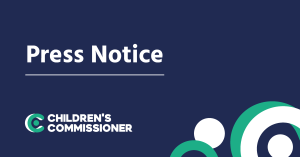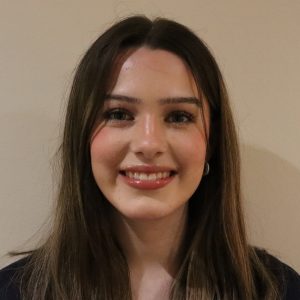- Almost 25,000 children are being educated in unregistered alternative provision, with more than half having Education, Health and Care Plans (EHCPs)
- Lack of national oversight sparks concerns for children’s safety, wellbeing and educational outcomes – as Children’s Commissioner warns unregistered alternative provision is propping up a failing SEND system
- Soaring number of children being placed in alternative provision settings by local authorities, with placements doubling over last five years – alongside dramatic rises in the number of children with EHCPs
Almost 25,000 children are being educated in unregistered alternative provision (AP) settings with no national oversight or standards, more than half of whom have special educational needs and disabilities (SEND), the Children’s Commissioner’s new report has revealed.
The number of children being placed in unregistered AP settings has almost doubled over the past five years, with many placed there long-term.
In a report published today by Dame Rachel de Souza, she warns the sharp rise in the use of unregistered AP is creating a ‘shadow SEND system’ that disproportionately impacts children with Education, Health and Care Plans (EHCPs) and those from the most deprived neighbourhoods.
It comes as government data published just last week shows the number of children with EHCPs has increased by 10% in just 12 months – with less than half of plans being provided within the 20-week statutory timeframe.
Dame Rachel de Souza, the Children’s Commissioner for England, said:
“Great alternative provision can offer a lifeline for children facing barriers to attending mainstream school, such as mental health issues or additional needs – and many of the best examples of these placements are a child’s first positive experience of education.
“But I am increasingly concerned by the over-reliance on unregistered placements, especially for children with EHCPs, many of whom spend long stretches of their education there without a clear plan for meeting their needs.
“As the current system of support in mainstream and special schools fails, schools and local authorities are increasingly using unregistered alternative provision as a shadow SEND system, one that fills the gaps where registered educators can’t. But without the oversight from registration, it means there can be no guarantee in the quality of education being provided in these placements, nor that staff are properly trained – or have even passed the most basic safeguarding checks.
“Urgent reforms to the AP system must go hand in hand with the government’s forthcoming plans to fix the broken and fragmented SEND system. Every service in a child’s life – education, health, social care and safeguarding – must be compelled to work together to meet children’s needs of all kinds, removing the hoops too many families tell me they are having to jump through to get help.
“We cannot allow our most vulnerable children to be educated in the least regulated settings – and which, in the worst cases, are unsafe, run by individuals intent on exploiting them – simply as a way of relieving the pressure on a system that’s at breaking point.”
Data analysis by the Children’s Commissioner’s office revealed in 2023/24 there were 24,325 children in unregistered AP, comparable to the number of children in registered state-funded AP. 76% of placements in local authority commissioned unregistered AP were for children with an EHCP in 2023/24, up considerably from 56% in 2018/19. As a result, in 2023/24, roughly 1 in 50 of all children with an EHCP (2.3%) were in an unregistered AP setting.
Currently unregistered alternative provision is intended to be used as part-time, short-term placements for children who have often disengaged from mainstream education, including those with special educational needs, mental health challenges, or difficult home lives.
For some children, they can offer valuable bespoke support, for instance through forest schools, one-on-one tuition, therapeutic places or vocational courses – but those that are not registered with the Department for Education are not subject to any national education requirements or regulation, so the quality of education or safety of students cannot be known.
On average, the 24,325 children in unregistered AP in 2024/24 were there for most of a full year, 39 weeks. Of the children who were recorded as having ever been in unregistered AP at any time between Years 7 and 11, 22 were there for those full five years of their secondary education.
Key findings from today’s report include:
- Local authority commissioned placements in unregistered AP have nearly doubled over the last five academic years, with a 91% rise from 5,997 placements in 2018/19 to 11,436 in 2023/24.
- Children from disadvantaged backgrounds and those with special educational needs were disproportionately likely to be in unregistered AP, with children in unregistered AP being over 11 times more likely to have an EHCP, and 1.3 times more likely to live in the most income-deprived neighbourhoods.
- The majority of children in unregistered AP attended the settings long-term, regardless of the referral reason. As of Spring 2023/24, the average placement lasted for 276 days (39 weeks) and was attended by the child for the equivalent of more than half the school week. However, for children placed in unregistered AP because it was named on their EHCP, their average placement lasted 59 weeks and was attended for almost their entire school week.
- 91 potential illegal schools were discovered operating in January 2023/24, attended by over 1,000 children. Unregistered APs are required to register with the Department for Education when they grow to a certain size: full-time education to five or more children of compulsory school age, or to at least one school-age child with an EHCP or who is in care. The potential illegal schools found by the office appeared to be in contravention of their legal responsibility to register as a school and subject themselves to national inspections. This information was shared with Ofsted.
The lack of national oversight of unregistered AP placements means central government does not know where – or how – most of the 24,325 children are being educated. In some instances, children were found to be in settings which offered no education, while Ofsted investigations found settings operated in appalling conditions run by individuals with criminal records.
Anyone can establish an unregistered AP setting, which then operates without official oversight from the local authority or Ofsted, creating risks to children’s safety and the quality of their education.
Previous research by the Children’s Commissioner has shown that 22% of children remanded or sentenced to custody in a secure setting – such as a Young Offender Institution – had most recently been educated in an unregistered AP.
The Children’s Commissioner is calling for urgent action, including:
- Introduction of a national register. The Commissioner recognises the benefits of unregistered APs: as settings not registered as schools, unregistered APs enjoy a low level of legislative responsibility, which allows them to operate as a small and adaptable market which can complement the offer of neighbouring schools. But there must be some oversight – before providers can offer education to children, they must have to register as ‘licensed supplementary education’ with the Department for Education and pass a national standards inspection undertaken locally. Providers that do not meet those standards or fail to register would be deemed to be unregistered and therefore acting illegally. Ofsted should be given powers to intervene in these cases, and the Department for Education should be given powers to close providers and fine owners.
- Implement national standards. Create national quality standards for licensed education providers covering safeguarding, education quality, health and safety and child wellbeing. Independent Quality Assurance Teams in each local authority to conduct inspections.
- Improve data collection. Use the national register to produce accurate and consistent data on AP usage and provider types – where data returns reference the Unique Provider Code. Improved data collection would provide clarity on placement types and referral reasons for vulnerable children.
- Review of all unregistered AP. Government to commission a review of all types of unregistered AP provision to consider the evidence of what works, and to understand its purpose in order to set metrics for child outcomes.
- Introduce a ‘Single Child Plan’ to coordinate support. Replace fragmented support systems with a unified Single Child Plan, including education, health, social care and safeguarding needs. Schools should have powers to commission educational provision through the Single Child Plan.






